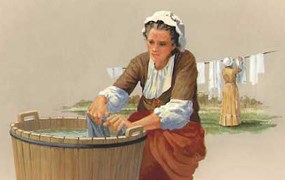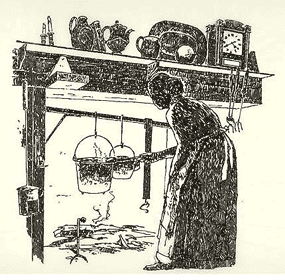
NPS Illustration. Although the operation of the furnace was largely men's work, the women of Hopewell Furnace performed many tasks essential to the community. These tasks included providing food and clothing. They also served as seasonal workers to bring in the farm crops and to supply the colliers with the wood needed to make charcoal. Many families depended on the extra money earned by women to survive economically. Some Hopewell women earned money by using their homemaking skills to prepare and sell a variety of food goods such as butter, pickles, and bread. They also profited by selling eggs and chickens as well as making and selling candles and soap. Single men were willing to pay eight cents for a home cooked meal. These men also paid women to wash and mend their clothes. Women skilled with a needle and possessing an eye for fashion found work as seamstresses for single men and for residents of the ironmaster's house. Homes with spinning wheels provided women with an opportunity to increase the family income through the sale of thread or yarn. Outside their homes, women performed a variety of jobs in the furnace community. They served as maids and cooks at the ironmaster's house and as teachers at the community school. Hopewell employed several women as teachers including Susan Brown during the 1830s and Catherine Rhoads in 1871. Women and children were hired to perform numerous seasonal duties on Hopewell's farm. These tasks included hoeing corn, binding grain, pulling flax, shearing sheep, and picking apples. Usually women were hired during the harvest, but a number of chores were available all year, including whitewashing fences and buildings and milking cows. The average pay they received was 25 cents per day, enough to buy one yard of cloth or 12 pounds of flour. Some women ran their own farms, usually after the death of their husbands, and sold such items as indian corn, feathers, and pigs to the furnace store. 
NPS Illustration. The hills surrounding the furnace provided the wood needed to make charcoal, the fuel used for iron production. Here some women were employed as woodcutters earning 27 cents per cord. During one 30-year period, six women were credited with cutting wood. Elizabeth Mock earned over 90 dollars in two years as a woodcutter, and Elizabeth Hughs was paid for cutting 41 cords of wood in 1836. Although furnace work and mining were usually regarded as "men's work," women were not totally excluded from these trades. Two widows, Margaret Painter and Elizabeth Mervine, were employed to clean castings and prepare the iron for market. This was a strenuous job, tipping stove plates and other iron items while removing sand from the pattern. They also filed the rough edges from individual pieces. They earned 75 cents per ton of castings cleaned. Women could also be found at the iron ore mines. During the early 1830s, Mary Beavens, Elizabeth Mauger, and Eliza Painter were paid for mining ore, and Henry Painter collected pay for more than 13 loads of ore sent to the furnace by his daughter. Furnace records show that from 1837-1846 Jane Clemons was paid as a molder. Like most of the other women who were paid for doing "men's jobs," little is known about her. Did she mold and cast iron products as the men or do the records represent the earnings of an under age son? As the 19th century drew to a close, Hopewell Furnace could no longer operate profitability as more efficient and cheaper methods of making iron were developed and industries moved out of the rural areas and into the cities. This forced the families of Hopewell to find jobs elsewhere. Regardless of whether Hopewell women worked in or outside the home, it is clear they added to, or in some cases, entirely provided for their family's income. It is also clear women played an important role in filling many of the needs of this once busy iron-making community. |
Last updated: February 26, 2015
